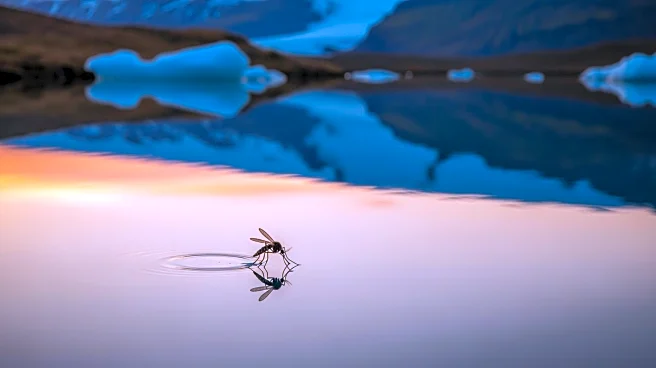What's Happening?
Mosquitoes have been detected in Iceland for the first time, as the region experiences warming temperatures due to climate change. The species identified is Culiseta annulata, known for its cold tolerance.
The discovery was made by insect enthusiast Björn Hjaltason, who spotted the mosquitoes in the garden town of Kjós. Entomologist Matthías Alfreðsson confirmed the presence of three mosquitoes, two females and one male. Iceland's warming climate, occurring at a rate four times faster than the rest of the Northern hemisphere, has made the country more hospitable to mosquitoes, which require warm, stagnant water for breeding.
Why It's Important?
The detection of mosquitoes in Iceland is significant as it illustrates the impact of climate change on species distribution. Mosquitoes are vectors for diseases such as malaria and dengue, and their expansion into new areas poses a public health risk. The situation in Iceland reflects a global trend where warming temperatures are enabling mosquitoes to inhabit regions previously too cold for them. This can lead to increased incidence of mosquito-borne diseases, affecting public health and requiring adjustments in healthcare strategies. The event underscores the urgency of addressing climate change to prevent further ecological disruptions.
What's Next?
The presence of mosquitoes in Iceland may lead to increased monitoring and research to understand their potential establishment and impact on local ecosystems. Public health officials may need to prepare for the possibility of mosquito-borne diseases and consider preventive measures. The situation could also drive policy discussions on climate change mitigation and adaptation strategies. Stakeholders may focus on reducing emissions and protecting ecosystems to prevent further spread of invasive species.
Beyond the Headlines
The discovery of mosquitoes in Iceland highlights the role of citizen science in environmental monitoring. It demonstrates how individuals can contribute to scientific understanding and help track changes in biodiversity. The event may also prompt discussions on the ethical implications of climate change and the responsibility of societies to address its causes and effects.








